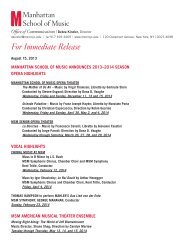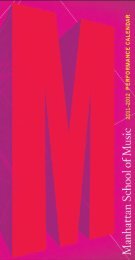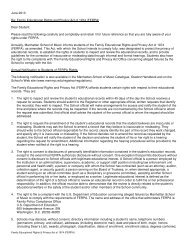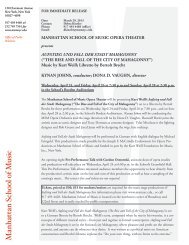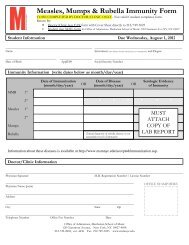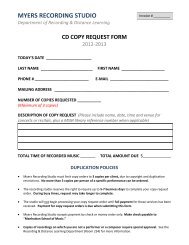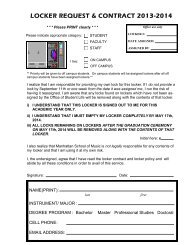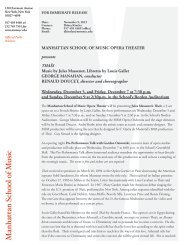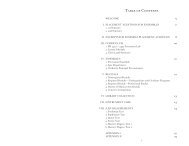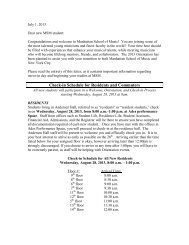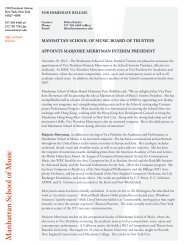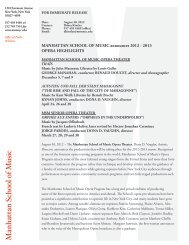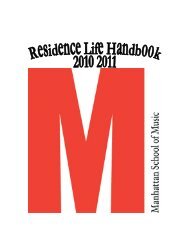Placement Exam Information - Manhattan School of Music
Placement Exam Information - Manhattan School of Music
Placement Exam Information - Manhattan School of Music
- No tags were found...
Create successful ePaper yourself
Turn your PDF publications into a flip-book with our unique Google optimized e-Paper software.
REQUIRED PIANO(required <strong>of</strong> all students except keyboard and guitar majors)The required piano exam includes reading at sight and the demonstration <strong>of</strong> thefollowing skills: major and minor scales, chord progressions, triads and inversions,harmonization, transposition, and sight-reading. The level <strong>of</strong> sight-reading is equivalentto repertoire from the text Essential Keyboard Repertoire Vol. I, ed. Lynn Olson. If youhave never had piano training, you will be placed immediately into Required Piano I.More information is available upon request.THEORETICAL STUDIES(required <strong>of</strong> all students)Students must acquire a musical education that goes beyond the technical trainingneeded for performance. Those enrolled in a degree or diploma program at <strong>Manhattan</strong><strong>School</strong> <strong>of</strong> <strong>Music</strong> are required to gain fluency in analytical skills and understanding <strong>of</strong> thestructural forces that underlie musical composition.The theory curriculum at MSM stresses the interdependence <strong>of</strong> theoretical skills andperformance. Based on this premise, placement examinations determine that student’slevels <strong>of</strong> skill in harmony, counterpoint, form and analysis, dictation, and sight-singing.These examinations are to be taken only once.Undergraduate students who do not meet college-level standards at <strong>Manhattan</strong> <strong>School</strong><strong>of</strong> <strong>Music</strong> are placed in remedial classes. For graduate students whose placementexams indicate some deficiencies but a reasonable knowledge <strong>of</strong> undergraduate theory,the department <strong>of</strong>fers various courses, which complete the theory requirements atMSM. These courses do not count toward the cumulative credit needed to graduatewith the master’s degree. The tests include:Harmony/Counterpoint/Form and Analysis:Testing commences with rudiments – clefs, key signatures, intervals, accidentals, andrhythm. Sufficient knowledge allows the applicant to continue with the materials <strong>of</strong>diatonic harmony, chromatic harmony, modulations, figured bass, melodyharmonization, and analysis <strong>of</strong> harmony, counterpoint, and form. Those who haveindicated a working knowledge <strong>of</strong> this area proceed to principles <strong>of</strong> the 20 th century.Dictation:The instructor plays on the piano the musical material, which the students are expectedto notate. Melodic, harmonic, and rhythmic material will be played, beginning withsimple diatonic material and progressing to more difficult chromatic and atonal material.To permit the student to complete each example, several repetitions will be played.Sight-Singing:Students will be expected to sing melodies and perform rhythms at sight. This course <strong>of</strong>study parallels the contents <strong>of</strong> the harmony/counterpoint curriculum. <strong>Manhattan</strong> <strong>School</strong><strong>of</strong> <strong>Music</strong> uses the “fixed do” and “movable numbers” methods.Fretboard harmony (guitar majors only):This test is designed to determine the level <strong>of</strong> knowledge <strong>of</strong> the fretboard fingerings,harmony, sight-reading, transposition, and figured bass.Classical Division <strong>Placement</strong> <strong>Exam</strong> Brochure – Page 2 <strong>of</strong> 3Last updated 3-2-2012



